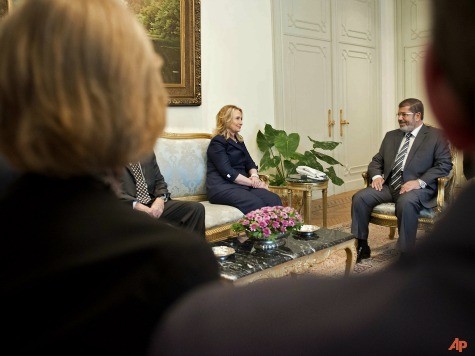Today, Breitbart News had the opportunity to speak exclusively with former Israeli ambassador to the United Nations and current president of the Jerusalem Center for Public Affairs Dore Gold. Ambassador Gold described the situation on the ground in detail, and suggested that an Israeli ground operation could only be forestalled by a full and complete end to all Hamas rocket attacks, as well as threat of future Hamas rocket attacks.
“Israel’s goal is very simple and actually very limited,” said Gold. “Its goal is to make sure that rocket fire against Israeli civilians comes to a complete halt. Some people think that’s impossible to achieve, but there’s a huge national consensus behind it. We’re not interested in pampering an Arab regime. We’re not interested in replacing Hamas with somebody else. All we’re interested in in stopping attacks on our cities.”
When asked whether the threat of attacks from Hamas could be stopped without a complete destruction of Hamas, Gold answered, “It depends on Hamas. Clearly Israel created an option for itself to pursue a ground campaign in the event that Hamas refuses to agree to a ceasefire.” And Gold said that a temporary ceasefire would not be enough to stop Israel; as he pointed out, “Hamas uses language that doesn’t seem to be terribly promising. It never talks about peace; it talks instead about a hudna [temporary truce until military build-up has been achieved], or a tahadiya [an even weaker ceasefire]. The terms Hamas uses to talk about a cessation of hostilities all describe Hamas holding off until it has enough military power to overturn the agreement it reaches with Israel.”
Gold said that Israel had no direct contacts with Hamas. He did say, however, that “there are contacts between other actors and Hamas, but it’s too early to say whether there are negotiations or not.” Both the United States and the European Union, Gold stated, are bound not to talk to Hamas because it is an internationally recognized terrorist organization. The West is therefore looking to Egypt as a conduit.
The problem, as Gold sees it, is that Hamas is pushing Egypt, attempting to see just how far they’ll go in their opposition to Israel. “Hamas sees itself as very independent from Egypt,” said Gold. “When the prime minister of Egypt visited the Gaza Strip last Friday, the Egyptians actually asked Hamas and Israel not to open fire during the visit. Yet Hamas apparently fired some 35 rockets at Israel while the Egyptian prime minister was there. So it seems that the Hamas is pushing Egypt, testing Egypt, seeing the limits of what it can do and what Egypt will do. Even though Hamas and the Egyptian Muslim Brotherhood are parts of the same movement, there’s more autonomy on the part of Hamas pursuing its own path in relationship with the Muslim Brotherhood than perhaps Egypt would like it to do.”
While Gold was not privy to interior discussions between the United States and Israel on the possibility of a ground assault, Gold did say, “Israel and the US have a very close relationship, and Israel feels incumbent to always keep the US updated on its plans.”
Gold blames the current conflict on Hamas feeling its oats after the Arab Spring. “I believe that Hamas feels it is in a new political environment because of the fall of many of the old military regimes in the Middle East and the rise of Muslim Brotherhood regimes in Egypt, to some extent in Libya, to a much greater extent in Tunisia, and possibly in the future in Syria as well. Hamas also has a connection with Iran which is its primary ally. Therefore the Hamas feels itself in a much more permissive environment.”
Barring a cataclysmic turnaround in Hamas’ policy, a ground assault on Gaza remains likely. And the chances of such a turnaround remain abysmally slim.

COMMENTS
Please let us know if you're having issues with commenting.